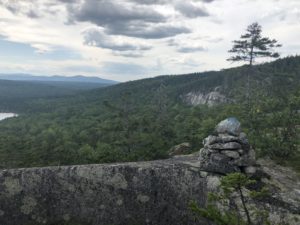by Stacie Haines
From 1997 to 2000, I served in the Peace Corps in Sub-Saharan Africa. I lived deep in a village along the Niger River where my only way out was a half day’s journey by bush boat on Wednesdays to the closest open air market. In the village, Tondeye, there was no running water, no electricity, and the only way to communicate was by learning Zarma, an unwritten language that is spoken in parts of Niger, Burkina Faso, and Nigeria.
Niger is ranked as one of the poorest countries in the world. Yet, throughout Niger, communities thrive as they live, work, laugh, and dance together. The people I knew had a very full and rich life without material possessions.
That said, life wasn’t without its challenges. Most Nigeriens receive very little, if any, medical attention. And, when, or if, they eat greatly depends on how much rain their crops receive. There was a drought during my time there. Each day you could feel the village holding its breath as they looked to the skies to see if this would be the day that it would break with rain. When it finally rained, it rained too much and many of the crops were destroyed by flooding.
This directly correlates to the actions we are taking here in the United States. Over time, our country has emitted the largest amount of carbon dioxide from the burning of fossil fuels for electricity, heat, and transportation. When greenhouse gases, such as carbon dioxide, hang out in our atmosphere, some of the Earth’s outgoing energy is trapped there. This has dangerously skewed climate and weather patterns across the globe. Countries that are already living on the brink, like Niger, are experiencing severe weather patterns that result in further desertification, drought, illness, starvation, and even death.
Climate change is affecting every community across the globe but not equally. It is an environmental justice issue when the wealthiest countries in the world are causing great harm to the poorest.
Never has it been more important that we address the climate crisis than it is right now. It is our obligation to all of humanity—and the many species in threat of extinction—to do so. In Maine, under the direction of Governor Mills, a diverse group of stakeholders came together in 2020 to develop the 4-year Maine Won’t Wait action to reduce carbon emissions by 80% and use 100% renewable energy—all by 2050.
Among the strategies to achieve that goal was the recommendation to form a state-based Climate Corps. Over the past year, Volunteer Maine, Maine’s Commission for Community Service, partnered with about one hundred stakeholders to develop a plan for establishing a Climate Corps. That thoroughly researched and extensive plan was reported to the Environment and Natural Resources committee of the legislature on January 31st. Read the full report here.
I can personally attest to the benefits of volunteer service. Whether it be domestic or abroad, volunteer service is a chance to obtain skills and leverage career opportunities. In fact, seven out of ten former service members in Maine reported that their time as a service member helped them with their future employment.
Here in Maine, we need young professionals as a large percentage of our workforce is set to retire in the upcoming years. Service opportunities have the potential to attract young people to Maine or allow them to stay here.
People who serve in a community tend to set deep roots there. In Maine, 25% of the young adults who move here for a year of community service stay to make this state their home.
A Climate Corps service member could develop their skills in collaboration with Maine’s communities and organizations. This could provide the on-the-job training that is so desperately needed for young professionals to get to the next level in their career pursuits.
This legislative session, it is important that LD 1974, an Act to Establish and Fund the Maine Climate Corps Program, is implemented. It has been passed by the legislature but requires funding. The Appropriations and Financial Affairs Committee will determine that this week. Please sign this petition to send on to the committee. It needs support from Mainers far and wide today!
The funding requested of the state is a significant ask. Yet, considering the long-term returns of helping to build Maine’s workforce and curb climate change, it’s a very reasonable request. The cost of doing nothing is far greater for Maine people and our natural environment—and for marginalized communities around the world.
